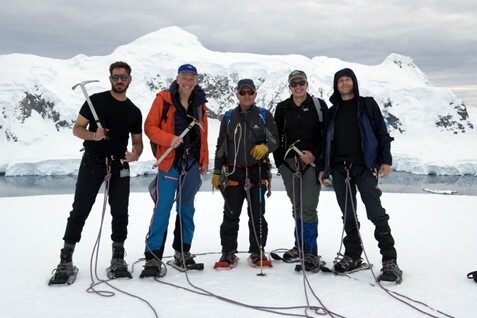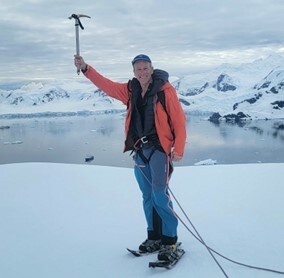Last chance to see the '1,000% Windfall' investigation; Breaking Into Money Management; Mountaineering in Antarctica
1) Tonight at midnight, we're taking down our "1,000% Windfall" video investigation...
It will open your eyes up to a new force changing the fortunes of the U.S. economy and Wall Street... And it could decide what car you buy next, how you vote in the next election, or where you go on vacation next year.
It could also be key to seeing a historic opportunity that could pay off 1,000% in the next 12 months.
If you haven't seen our special investigation yet, don't delay – again, it's coming offline at midnight tonight. Watch it here.
2) I regularly receive e-mails like this...
I recently graduated college and would someday like to manage money. I would like to now, but no one will trust some 22-year-old kid, understandably. Could you offer me some advice on this and what you have learned since you began managing money full time?
I'm not surprised by these e-mails, as the money management industry is highly attractive. But it's not right for everyone... and breaking into the business is extremely difficult.
So... is money management right for you?
My first response to potential job seekers is consider whether this industry is a good fit.
Many people get into this business for the wrong reasons: They want to get rich quickly, trading stocks and watching the minute-to-minute gyrations of the market... they get a rush from making big bets in the hope of making a big score... or they want to prove they're smarter than the market.
These are not only the wrong motivations, but they're likely to lead to disaster.
Instead, those most likely to succeed are patient and disciplined, highly intelligent and good with numbers, simultaneously confident and independent, yet also humble. They make decisions based on analysis, not emotion, and, most important, they are businesspeople that enjoy learning and thinking about companies and industries.
Next, educate yourself. Before applying for any job, you should make every effort to learn as much as possible on your own. When it comes to money management, it will likely take months if not years of reading and studying before you're ready to apply for a job.
What should you know?
Let's start with the basics: You should be intimately familiar with all of the following terms (these suggestions also apply to those who simply want to become better investors): revenues, costs of goods sold, gross margin, SG&A, operating margin, net (profit) margin, earnings per share, pro forma earnings, option expense, dilution, share repurchase, IPO, secondary offering, free cash flow, float, depreciation, amortization, capital expenditure, equity, assets, liabilities, shareholder's equity, receivables, inventories, goodwill, leverage, lease obligations, tangible book value, debt-to-equity ratio, cash conversion cycle, return on equity, assets and invested capital, market capitalization, enterprise value, price-to-earnings book and sales ratios, EBITDA, NOPAT, EVA, GAAP, burn rate, and many others. There are numerous textbooks and websites covering all of these terms.
Berkshire Hathaway (BRK-B) vice chairman Charlie Munger once said, "I don't think you can be a really good investor over a broad range without doing a massive amount of reading."
Every sensible investor – and certainly anyone applying for a job at a value-oriented investment firm – should be familiar with this body of literature:
- The Intelligent Investor
- Warren Buffett's annual letters (available for free on Berkshire Hathaway's website)
- Poor Charlie's Almanack: The Wit and Wisdom of Charles T. Munger
- The Superinvestors of Graham-and-Doddsville
Then, on a day-to-day basis, read most of the following:
- The Wall Street Journal
- The New York Times business section
- Barron's
- ValueInvestorsClub.com (even if you're not a member, you can still access a lot of material as a guest)
Finally, I highly recommend attending the Berkshire annual meeting, which is taking place this year on Saturday, May 6. There's no admission fee – just buy one B-share, which costs a little more than $300 and is a great investment to boot!
I've been to the past 25 meetings because there is no better investment education than listening to two of the greatest investors ever answer questions for six hours.
Tomorrow I'll continue with my advice, now that you've educated yourself, on how to actually get a job in this industry...
3) I just realized that I forgot to share one highlight from our Antarctica trip in late December...
We were able to sign up for three small-group adventures: kayaking, camping overnight on shore, and mountaineering. In my January 19 and January 27 e-mails, I shared pictures of kayaking and camping... Today, I'll share two pictures from my mountaineering expedition. For more pictures and a description of what we did, see my Facebook post here. Excerpt:
The ship had two experienced mountaineering guides, Richard and Dave, who took groups of 12-16 passengers for snowshoe hikes to the top of nearby hills – once every morning and afternoon.
But I didn't schlep my mountaineering boots all the way to Antarctica to go for a little hike – I wanted some action! So when we were all signing up at the beginning of the trip, I told them I had heavy-duty boots, outlined my experience (Mt. Blanc, Matterhorn, Eiger, Monch, Jungfrau, Cotopaxi, and the Nose of El Capitan), and asked to do something as challenging and epic as possible.
For a while, it didn't look like it would be possible because the bright sunny days – which were otherwise wonderful! – had warmed the snow, increasing the risk of an avalanche on steep slopes. But one day near the end of the trip, Richard and Dave delivered...
Best regards,
Whitney
P.S. I welcome your feedback at WTDfeedback@empirefinancialresearch.com.



